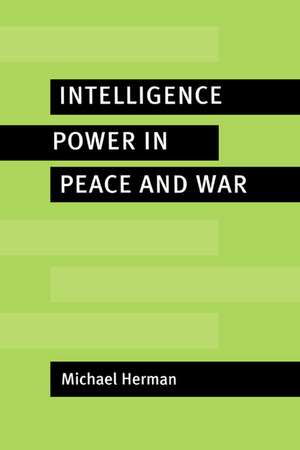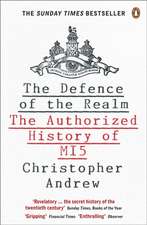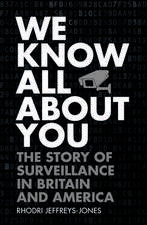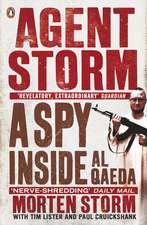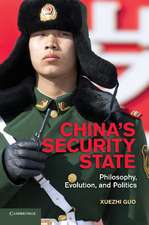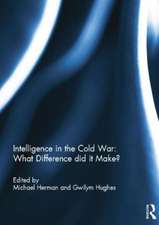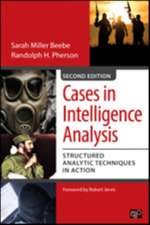Intelligence Power in Peace and War
Autor Michael Hermanen Limba Engleză Hardback – 12 oct 1996
| Toate formatele și edițiile | Preț | Express |
|---|---|---|
| Paperback (1) | 343.00 lei 3-5 săpt. | +27.93 lei 4-10 zile |
| Cambridge University Press – 12 oct 1996 | 343.00 lei 3-5 săpt. | +27.93 lei 4-10 zile |
| Hardback (1) | 821.14 lei 6-8 săpt. | |
| Cambridge University Press – 12 oct 1996 | 821.14 lei 6-8 săpt. |
Preț: 821.14 lei
Preț vechi: 954.82 lei
-14% Nou
Puncte Express: 1232
Preț estimativ în valută:
157.15€ • 163.46$ • 129.73£
157.15€ • 163.46$ • 129.73£
Carte tipărită la comandă
Livrare economică 15-29 aprilie
Preluare comenzi: 021 569.72.76
Specificații
ISBN-13: 9780521562317
ISBN-10: 0521562317
Pagini: 440
Ilustrații: 18 b/w illus.
Dimensiuni: 158 x 235 x 32 mm
Greutate: 0.8 kg
Ediția:New.
Editura: Cambridge University Press
Colecția Cambridge University Press
Locul publicării:Cambridge, United Kingdom
ISBN-10: 0521562317
Pagini: 440
Ilustrații: 18 b/w illus.
Dimensiuni: 158 x 235 x 32 mm
Greutate: 0.8 kg
Ediția:New.
Editura: Cambridge University Press
Colecția Cambridge University Press
Locul publicării:Cambridge, United Kingdom
Cuprins
Introduction; Part I. Evolution and Outline: 1. Antecedents; 2. Organizations; 3. Resources, stages and subjects; Part II. Components and Boundaries: 4. Collection sources; 5. Collection characteristics; 6. All-source analysis and assessment; 7. Boundaries; Part III. Effects: 8. Intelligence and national action; 9. International action; 10. Intelligence and security; 11. Intelligence threats; 12. Intelligence cooperation; Part IV. Accuracy: 13. Failure and remedies; 14. Problems of defence intelligence; 15. Top level assessment; Part V. Evolution and Management: 16. The production process; 17. Managing the community; 18. The agency manager; Part VI. The 1990s and Beyond: 19. National importance; 20. International dimensions; Part VII. Summary: 21. Modern intelligence power.
Recenzii
'Michael Herman has produced a very thought provoking and important book for understanding how an intelligence community works, when it fails and how it might work better … It is set to be a standard for those who wish to understand the value of intelligence in the functioning of the modern state.' Dr Paul Latawski, RUSI
'Written by a professional who is also an academic, this book lays the foundations for a theory of 'intelligence power' - the generic capability that is a 'multiplier' the key to successful planning and action, and an instrument of policy in its own right. Herman dissects and analyses the autonomy of intelligence organisations and develops principles for ensuring the quality of the product and the efficiency of the processes. The book ranges from theory to practice and its comprehensive scope will appeal to layman and professional alike.' Professor Michael MccGwire, OBE
'Intelligence Power in Peace and War is based on an attractive combination of personal experience, wide reading and scholarly reflection. It is clearly and persuasively written.' Professor Christopher Andrew, University of Cambridge and author of For the President's Eyes Only: Security, Intelligence and the American Presidency from Washington to Bush Christopher Andrew regularly appears on Radio 4.
'… is one of those books that invite the adjectives such as 'authoritative' and 'magisterial'. The organization is methodical, the analysis meticulous, the range of sources extraordinary and the writing crisp and lucid.' Lawrence Freedman, Intelligence and National Security
'This is the best overview of the nature and role of Intelligence that I have read. It is surely destined to become a standard work …' Professor Christopher Andrew, University of Cambridge
'The whole book derives from wide and obviously scrupulous research, very considerable personal experience and, quite clearly, deep reflection.” Louis le Bailly, Naval Review
'… there has been a grandscale breakthrough … No one who is serious about intelligence studies should fail to become familiar with this book.' H. Bradford Westerfield, Intelligence and Counterintelligence
'This is an important book about the Anglo-Saxon tradition of intelligence management.' Michael I. Handel, The International History Review
'Herman has written the most complete in-depth study of intelligence yet to appear. A former British intelligence officer … he combines practical experience with astute and sophisticated academic understanding to produce a book that should become the basic intelligence text and a professional bible.' J. D. Stemple, Choice
'Written by a professional who is also an academic, this book lays the foundations for a theory of 'intelligence power' - the generic capability that is a 'multiplier' the key to successful planning and action, and an instrument of policy in its own right. Herman dissects and analyses the autonomy of intelligence organisations and develops principles for ensuring the quality of the product and the efficiency of the processes. The book ranges from theory to practice and its comprehensive scope will appeal to layman and professional alike.' Professor Michael MccGwire, OBE
'Intelligence Power in Peace and War is based on an attractive combination of personal experience, wide reading and scholarly reflection. It is clearly and persuasively written.' Professor Christopher Andrew, University of Cambridge and author of For the President's Eyes Only: Security, Intelligence and the American Presidency from Washington to Bush Christopher Andrew regularly appears on Radio 4.
'… is one of those books that invite the adjectives such as 'authoritative' and 'magisterial'. The organization is methodical, the analysis meticulous, the range of sources extraordinary and the writing crisp and lucid.' Lawrence Freedman, Intelligence and National Security
'This is the best overview of the nature and role of Intelligence that I have read. It is surely destined to become a standard work …' Professor Christopher Andrew, University of Cambridge
'The whole book derives from wide and obviously scrupulous research, very considerable personal experience and, quite clearly, deep reflection.” Louis le Bailly, Naval Review
'… there has been a grandscale breakthrough … No one who is serious about intelligence studies should fail to become familiar with this book.' H. Bradford Westerfield, Intelligence and Counterintelligence
'This is an important book about the Anglo-Saxon tradition of intelligence management.' Michael I. Handel, The International History Review
'Herman has written the most complete in-depth study of intelligence yet to appear. A former British intelligence officer … he combines practical experience with astute and sophisticated academic understanding to produce a book that should become the basic intelligence text and a professional bible.' J. D. Stemple, Choice
Descriere
This book provides an analytic framework for understanding the 'intelligence community' and assessing its value.
